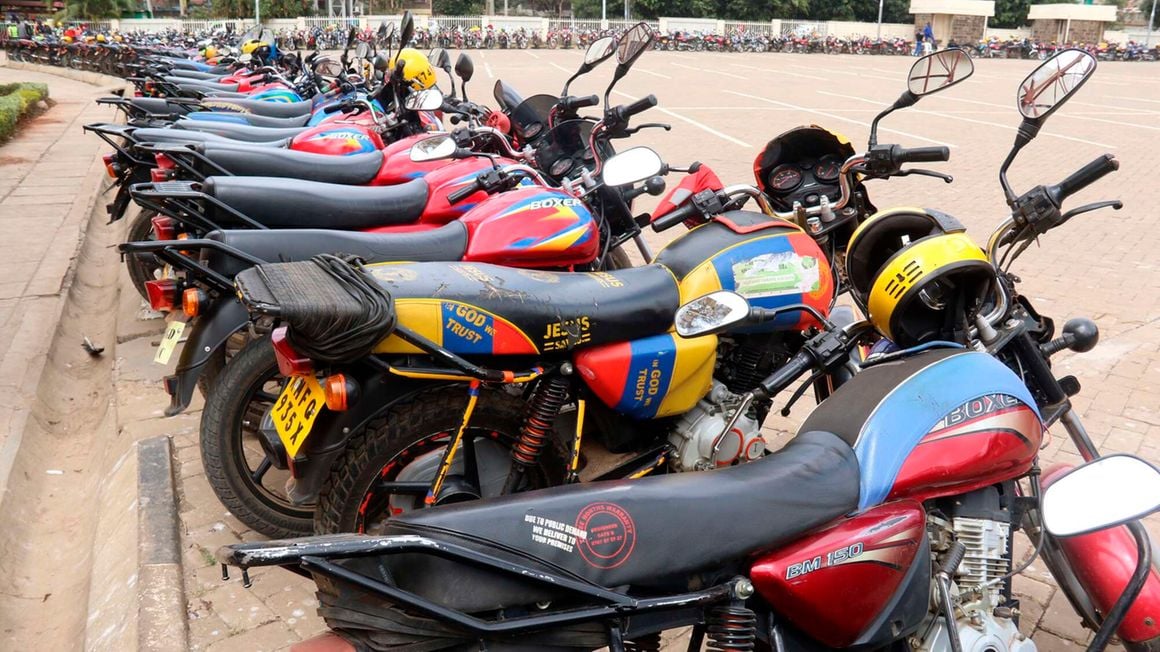
Motorbike sales rise fastest in 11 years after Covid job cuts. PHOTO | LUCY WANJIRU | NM
Imported motorcycles jumped 46.9 per cent or 109,260 last year as Kenyans rendered jobless in the wake of Covid-19 economic hardships sought livelihoods in the booming Boda Boda business.
Kenyans imported 342,197 motorcycles compared to 232,937 in 2020, new data from the Kenya National Bureau of Statistics (KNBS) shows.
This was the highest jump in the number of imported motorcycles since 2011 after former President Mwai Kibaki’s government zero-rated importation of motorcycles below 250cc to encourage more youth to take up employment in the transport sub-sector.
The increase in the number of imported motorcycles came a year after close to 1.7 million Kenyans lost their jobs owing to the implementation of containment measures aimed at curbing the spread of the Covid-19 pandemic.
Several businesses—especially those in hospitality, aviation and entertainment—buckled under the weight of the pandemic, leading to massive layoffs and furloughs.
The economy, however, created the highest number of jobs in six years following the easing of measures aimed at curbing Covid-19’s spread, a boost to the more than one million young people who graduate from colleges and secondary schools.
ALSO READ: C&G plans manufacture of motorcycles in Kenya
A total of 926,100 jobs were added in the formal and informal sectors last year, the highest since 2015 when 929,000 employment opportunities were created.
The growth in jobs came on the back of the easing of Covid-19 restrictions, which had led to 736,000 job losses in 2020.
The KNBS data show formal jobs created last year stood at about 173,000, signalling a resumption in hiring after economic growth rebounded from Covid-19 shocks.
But the additional salaried jobs in the formal sector fell short of the 192,400 jobs which were shed a year earlier.
Impassable roads in rural Kenya and traffic jams in urban areas have made motorcycles a popular mode of transport, with some studies estimating the earnings of the riders at around Sh1 billion in a day.
A study of the sector by listed firm Car & General (C&G), which sells motorcycles, their spare parts and other engineering equipment, shows that it also supports six million livelihoods indirectly, about 10 per cent of the country’s population.
C&G estimates that each rider makes an average of Sh1,000 per day from an average of 15 rides, translating to a daily income of Sh1 billion or Sh365 billion annually for the one million of them.
READ: Parliament blocks new motorbike tax
The imported motorcycles in 2021 were valued at Sh20.8 billion, an increase of 52.9 per cent from Sh13.6 billion in 2020.
The government has had a love-hate relationship with the motorcycle transport business which, although blamed for all kinds of infractions including a national security threat, has also been a major source of revenue and a source of employment for the youth.
In 2009 when the then Finance minister Amos Kimunya waived excise duty on imported motorcycles, the number of motorcycles shipped into the country jumped by a staggering 207 per cent to 119,336 from 38,870 in 2008.
The following year, there was a jump of 66 per cent of imported motorcycles to 198,018 as Kenyans continued to take advantage of the tax waiver.
The steady flow of motorcycles into the country reached its peak in 2011 when an additional 122,160 were shipped into the country, the highest ever since KNBS started compiling these figures in 2007.
This pushed the number of imported motorcycles to 320,178 compared to 198,018 the previous year.
The introduction of various taxes, including excise duty and the 16 per cent value-added tax, however, saw the number of imported motorcycles plummet by slightly over half to 165,276 in 2013 from 340,697 in 2012.
In 2015, the government introduced an excise duty of Sh10,000 on every imported motorcycle, to increase revenue from the booming transport sub-sector and to discourage increased shipping of two-wheeler which a lot of Kenyans have blamed for incidents of lawlessness on the roads, including being used to rob people.
The excise duty was later increased to Sh11,608 per unit for all motorcycles other than ambulances and those that are locally assembled.
In his budget speech last year, then Cabinet Secretary for Treasury Ukur Yatani proposed to introduce a 15 per cent excise duty on motorcycle units as the government sought to have a piece of the billions being made by the sub-sector and narrow its ever-widening budget deficit.
This proposal was, however, rejected by Members of Parliament who were afraid of antagonising Boda Boda operators in an election year.
→ dakure@ke.nationmedia.com




No comments :
Post a Comment